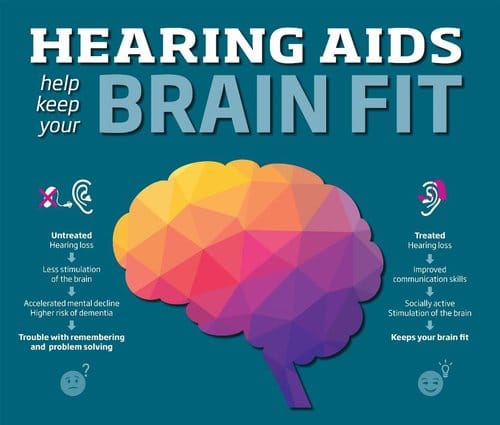Hearing loss is one of most common conditions affecting older people, so it is a surprise that many people are not addressing it adequately nor quickly enough.
As the population ages, people are becoming more interested in discovering the consequences of not managing hearing loss.
It is well known that the more hearing loss we have, the more negative effects it may have on our psychological state.
Depression is one of the main issues. The worse our hearing gets, the more difficult it becomes to communicate with friends and family, causing us to become socially isolated. That can lead to depression.
Now researchers believe hearing loss affects our cognition and increases risk of dementia.
A study has found that compared with older adults with normal hearing, those with hearing loss were more likely to develop dementia. In fact, the research showed there was a relationship between the level of unmanaged hearing loss and the level of dementia risk.
Compared to people with normal hearing, a mild hearing loss was associated with a two-fold increase in the risk of dementia, a moderate hearing loss with a three-fold increase, and severe hearing loss with a five-fold increased risk.
Apart from dementia, there is also now increasing evidence that there is a relationship between hearing loss, brain function decline and the loss of brain tissue.
Many studies have shown that older adults with hearing loss have an increased chance of problems with thinking and memory when compared with those with no hearing loss. The researchers believe the extra effort we are putting into hearing creates an increased load on our brain function which is also important for our memory and decision-making.
What can we do?
A study conducted in 2015 revealed the opposite trend for people who treated their hearing loss – the rate of cognitive decline for people with hearing aids was not significantly different from that of people with no hearing loss.
And as well as slowing the rate of cognitive decline, treating hearing loss can have positive impacts on relationships through better communication and it boosts people’s confidence and makes them more optimistic.
Treating hearing loss early can help rehabilitate our cognitive decline and dementia through better communication with people close to us.
It often takes time for hearing loss to become apparent and it is often perceived as an unfortunate but insignificant part of the aging process.
With increasing evidence that hearing loss speeds up the process of cognitive decline it is important for people to address their hearing loss quickly and aggressively, getting their hearing checked and managing any hearing loss that is found.
This article provided by Audiologist Daniel Kim of Focus Hearing. Daniel is available at Crawford Specialist Centre, 12 Picton Street, Howick on Mondays, Tuesdays and Thursdays.
Focus Hearing Phone 09 533 6463 to book an appointment Mondays – Fridays.









